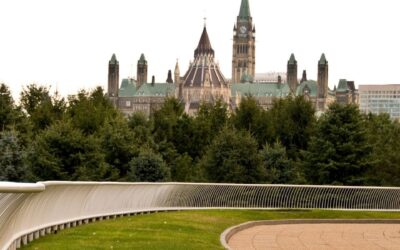COP26 is bearing down on us like a deadline for a major assignment — and we’re the student who has frittered away the entire term. Now it’s six hours to midnight and we have a sketchy outline, some useful notes from our nerdy roommate, and a big mug of coffee. Our intentions may be good but we’ve made the assignment a lot harder on ourselves.
And while, yes, an extension may be possible, a deadline concentrates the mind wonderfully: there’s still just enough time to do what we need to do — so long as we’re smart, ambitious, and determined.
Of course, the stakes are much higher in Glasgow than simply flunking a class. The IPCC report that came out in August made this crystal clear: Global warming is happening faster than expected. It’s driving extreme weather on every continent. And the tipping points that would trigger far more destructive consequences are looming closer.
Too many people living in Canada are already experiencing first-hand the destruction caused by climate change: floods, fires, heat waves. And because Canada is warming, on average, twice as fast as the rest of the world, the consequences of continued warming would be catastrophic. We are, quite literally, in the hot seat.
To put it simply: action in Glasgow is imperative because a lot of people are going to die if we fail. This summer, 569 British Columbians died because of a heat wave, and that’s climate change just getting started. The WHO predicts that climate change will kill at least 250,000 people a year after 2030 if nothing is done to dramatically reduce carbon pollution.
Millions of people do not have to die. Getting serious at COP26 in Glasgow, rather than delaying another year or another decade, will translate directly into lives saved.
Because here’s the most important thing about this moment we’re in, the autumn of 2021: the worst impacts of climate change can be still avoided, if we act fast. It’s not too late to change course — though we are in a rapidly closing window.
Projections in the IPCC report show with a high degree of certainty that if we hit net zero emissions globally by 2050, we could still limit warming to 1.5 degrees Celsius, avoiding catastrophic tipping points. The scientific consensus is clear: the faster we reduce our emissions, the cooler the planet will remain.
But it gets a lot harder from here. Like the student with the big assignment and the looming deadline, we know now that we should have started working on this project ages ago. We should have started reducing our emissions in the 1990s, or even before, when we first began to grasp “the greenhouse effect,” and what it would mean.
In a recent analysis, climate scientist Zeke Hausfather makes the point that, “If emissions had peaked back in 2000 we would be skiing down a bunny slope toward 1.5C. Today we face a double black diamond, and in a few years it will be a cliff.”
If saving lives isn’t a sufficient incentive for Canada to make real change in Glasgow, what about jobs? Runaway climate change threatens Canada’s prosperity: it’s hard to hold down a job when your house has been destroyed by a wildfire, or to keep your business running when a flood sweeps through your town.
Since 2010, the costs of weather-related disasters and catastrophic events have amounted to about 5 to 6 per cent of Canada’s annual GDP growth, up from an average of 1 per cent in previous decades.
And as an export-driven economy, Canada faces a sink-or-swim decade as the world rapidly decarbonizes. It’s inevitable that we’re going to see trillions of dollars in global investment moving away from high-carbon sectors. Canada doesn’t want to be the guy behind the counter at Blockbuster, watching movies on his phone and wondering why the place is empty.
Of course, climate change policy, and climate itself, is not a light switch, or a pass-fail course. No one single event will change our planet’s trajectory. But COP26 in Glasgow is, without question, a pivotal moment for Canada and the world.
With a new federal government just elected on a clear and strong platform of accelerated climate change commitments, a new minister of environment and climate change, and a ticking clock, now is the moment for Canada to chart a more ambitious course.
Originally published in the Toronto Star.









